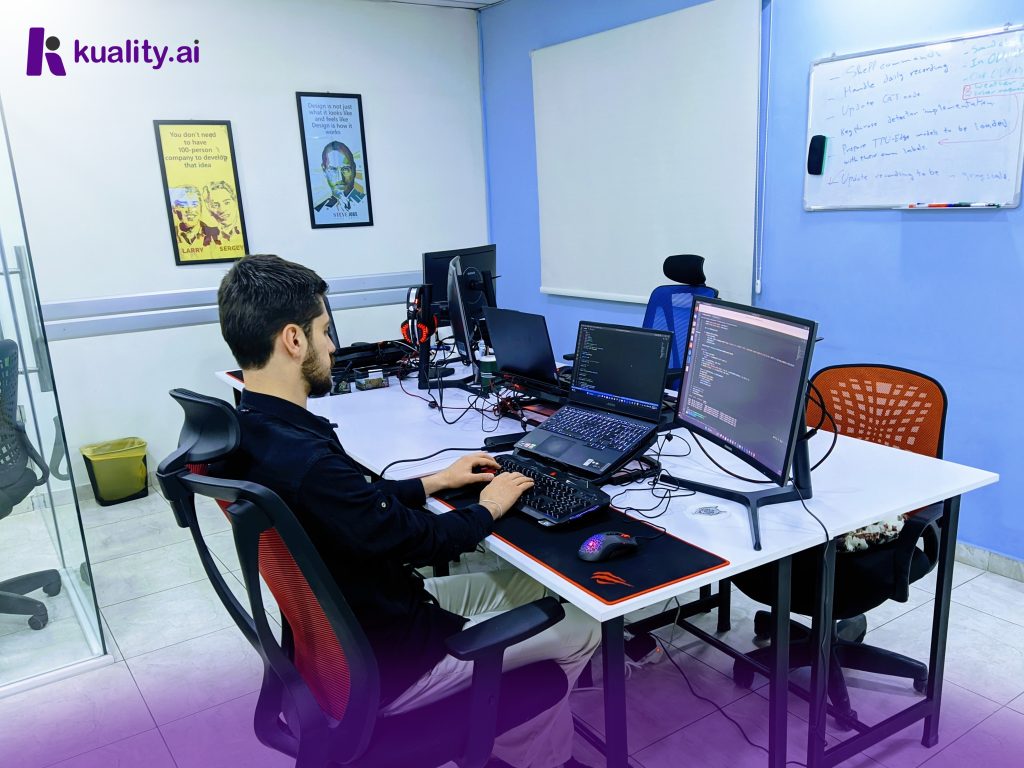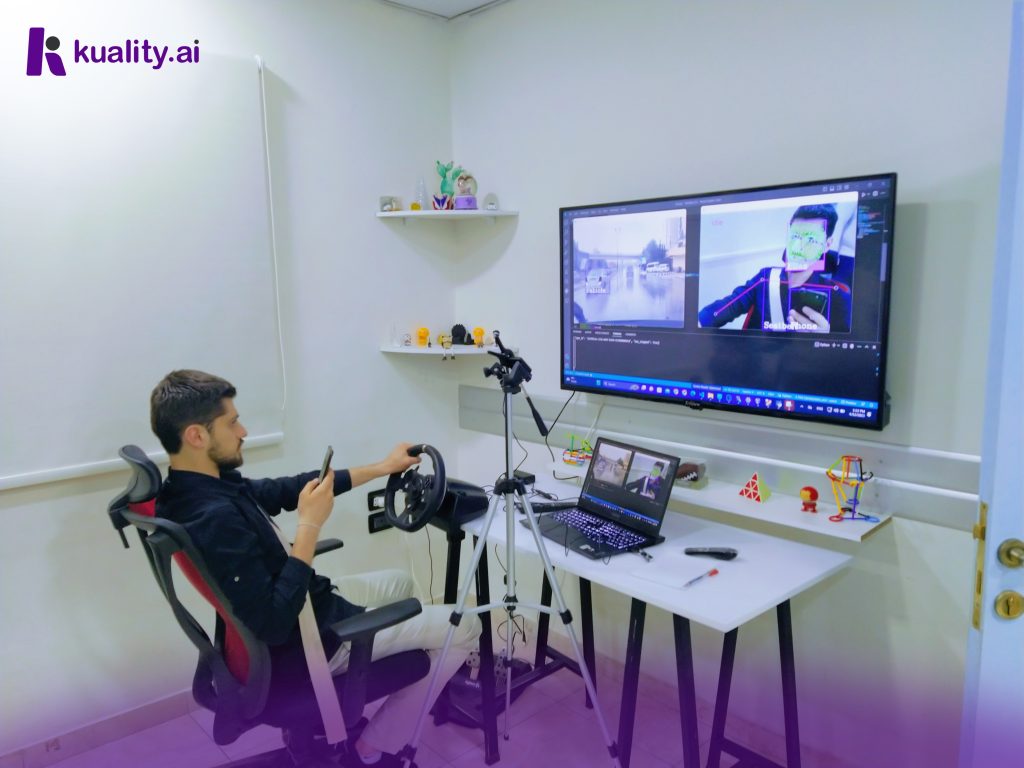

Elias Toome, an AI engineer at Kuality AI, shares insights on the essential tools and frameworks for aspiring AI professionals, staying current with advancements in AI, pivotal projects and experiences, and the importance of soft skills in the AI field.
Discovering a Passion for AI
Elias’s fascination with AI began during his university days when he stumbled upon a graduation project called “Smart Mirror.” The idea of a simple mirror transforming into an intelligent device capable of recognizing users and providing information intrigued him. This project sparked Elias’s curiosity and led him to explore the world of AI and machine learning (ML) further.
The Allure of Computer Vision and Machine Learning
As Elias delved deeper into AI, he found himself particularly drawn to computer vision, the ability of machines to recognize and understand visual information. He was captivated by the potential applications of computer vision in various fields, such as identifying organisms in nature or diagnosing diseases at an early stage. Elias believes that the limitless possibilities for learning and growth in this area are what make it so compelling.
Growing as a Junior AI Engineer at Kuality AI
Joining Kuality AI, an Emirati company specializing in AI technologies, allowed Elias to work with a team of experts and learn from their experiences. One of the most significant projects he was involved in was “ThirdEye” which employed computer vision and machine learning algorithms to reduce road accidents. Working on this project exposed Elias to various challenges and helped him develop new problem-solving approaches.
Overcoming Challenges in AI Engineering
Elias acknowledges that with every new project comes a set of challenges, especially when it comes to obtaining sufficient data for AI applications. While there are numerous resources for free data, most are only suitable for academic or research purposes. To overcome this obstacle, Elias suggests seeking the help of data scientists or partnering with specialized companies.
Technical challenges in coding and algorithm complexity are also inevitable in the field of AI. Elias recommends turning to experts for advice, as there are always more experienced engineers who may have faced similar challenges. Platforms dedicated to AI discussions can be particularly helpful in this regard.

The Impact of Multidisciplinary Experience
Before delving into AI, Elias worked as a webmaster and engaged in front-end and back-end development, This experience taught him the value of adaptability and ambition, as he quickly transitioned from focusing solely on front-end tasks to managing entire websites.
Elias’s multidisciplinary background has not only complemented his AI endeavours but has also fostered a growth mindset that is vital for success in the ever-evolving AI landscape. He believes that there is always something new to learn, and having a limitless ambition for knowledge is essential for thriving in the AI industry.
Essential Tools and Frameworks for Aspiring AI Professionals
Elias emphasizes that problem-solving is a crucial skill for any engineer, as their main task is to find solutions to various problems, often under constraints like cost or time. Python is the go-to programming language for AI, thanks to its simplicity and ease of use.
For more advanced learners, Elias recommends familiarizing themselves with TensorFlow, Google’s end-to-end open-source machine learning platform. TensorFlow offers several benefits, including ease of use, compatibility with various devices, the ability to use GPUs for training, and flexibility when working with real-time projects. It also supports devices with lower capabilities, such as mobile phones.

Staying Current with AI Advancements
In the fast-paced world of AI, staying updated on the latest tools and frameworks is essential. Elias uses social media, particularly LinkedIn, to stay connected to the AI community. However, he advises caution when reading articles on social media, as not all information is reliable. He considers social media a gateway to more credible sources like Medium.com, which features technical articles written by engineers about their experiences and challenges.
Github.com is another valuable resource, as it contains projects from individuals and companies, showcasing the tools and algorithms they use to solve specific problems or implement real-time features.
Elias also credits his network of experts and mentors for keeping him up to date on the latest AI advancements. These connections enable him to attend global conferences and learn from the best in the field.
Pivotal Projects and Practical AI Knowledge
Elias’ first project that combined his theoretical knowledge from university with practical experience was “Dawwar” a university graduation project. Alongside four fellow AI engineering students, they aimed to solve transportation issues and reduce costs through a mobile app that used machine learning algorithms to track users’ routines and match them with others who shared similar patterns. This project taught Elias how to apply AI algorithms and utilize mobile phone sensors in real-world applications.
Soft Skills and Qualities for Success in AI
In addition to technical skills, soft skills play a significant role in AI professionals’ success. Patience is vital, as the field is research-oriented and often requires multiple experiments to achieve the desired results. The ability to learn and read is also crucial, as the AI landscape is continually evolving, with new tools and solutions emerging regularly. Since there’s no limit to knowledge in AI, continuous learning is a must.
Advice for Those Considering a Career in AI
For individuals feeling overwhelmed or unsure about starting a career in AI, Elias encourages them not to be intimidated. The field of AI is expanding rapidly, with new algorithms and improvements consistently being developed. The industry has room for everyone and welcomes diverse ideas and innovations.
Elias believes that AI will soon become an integral part of our daily lives, much like mobile phones. AI has the potential to save time, money, and energy and even preserve human lives by taking on complex and dangerous tasks. The future of AI promises to be an exciting and rewarding journey for those who choose to pursue it.
Conclusion
Elias’s journey in the world of AI and computer vision has been marked by passion, curiosity, and a hunger for knowledge. His experiences at Kuality AI, have allowed him to grow both professionally and personally. By embracing the challenges that come with AI engineering and leveraging his multidisciplinary background, Elias continues to make significant contributions to the field and inspire others to join him on this exciting journey.


